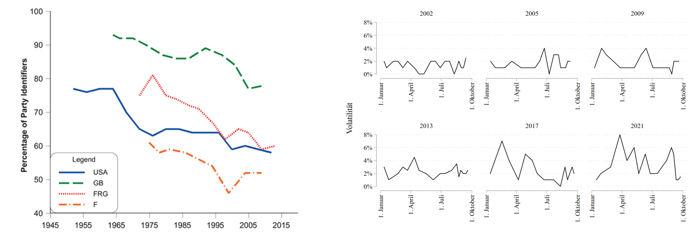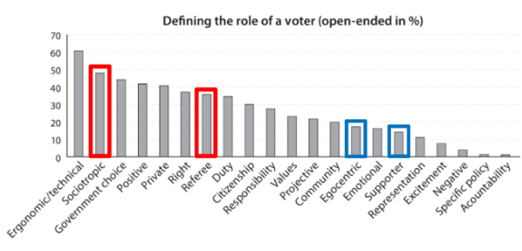The 'Homo Suffragator': Foundations of Psychological and Experience-Based Voter Relationship Design
In an era where traditional party loyalties are eroding and voters are becoming increasingly volatile, conventional political marketing is reaching its limits. The 'Homo Suffragator'—a concept that views voters as active participants with their own personalities, memories, and identities—offers a fresh perspective on voting behavior. This understanding opens new vistas for Voter Relationship Management, aiming to redefine the relationship between political parties and citizens. By emphasizing personality, memory, and identity as central elements of voting behavior, this approach invites us to perceive political communication as a dialogic process that extends beyond the mere act of voting, potentially strengthening trust in democracy.
FEATURE
Dennis Rudolf
4/3/20243 min read


The notion that casting a vote equates to expressing a preference reflects the core principle of representative democracies driven by competition. This concept is evident in the framework of an electoral campaign triangle, which shapes interactions among parties, media outlets, and voters during a typical election (Brettschneider 2021).
However, considering insights from human psychology, this assumption seems somewhat dubious. Voters often possess incomplete information, conflicting interests, and evolving preferences across diverse policy domains. Expecting voters to engage with complex and opaque political processes purely through rationality overlooks the realities of human behavior. Similarly, from a psychological standpoint, the idea of party identity appears less straightforward. It's not intuitive, especially in multi-party systems, that individuals would anchor their personal identity and democratic understanding solely around their affiliation with just one political party.
The erosion of traditional party loyalties or the increasing volatility among voters are enduring and escalating societal trends that have reshaped the dynamics of the political landscape (Arzheimer 2006; Dassonneville et al. 2012; Berz 2021).


It may therefore come as little surprise that if political marketing - despite changing circumstances and new research findings - is based solely on the status quo of instrumental and expressive electoral research, it will no longer deliver satisfactory or predictable results. If a large number of citizens no longer have a fixed party identity (Fig. 1 left, Dalton 2016; Fig. 2 right, Berz 2001), this may change voting behavior and the nature of politics in a positive or negative way. For political communication, this requires a rethinking of the relationship between democratic parties and individual voters as a continuous dialog.
Personality, memory and identity - Psychological dimensions of voting behavior
In their study "Inside the Mind of a Voter," Sarah Harrison and Michael Bruter base the idea of a "Homo Suffragator." This concept places the right to take democratic responsibility for one's community at the center of their voting choice. Therefore, voting behavior is fundamentally to be understood as an expression and projection of a worldview or an attitude towards parties, democracy, and society, determined by three central dimensions: (1) personality, (2) memory, and (3) identity.
Discrete personality traits (such as fear, risk-taking, desire for freedom, readiness for conflict, etc.), preferences for moral hierarchies, as well as egocentric or sociotropic tendencies, capture aspects of personality that are relevant for citizens' perception, evaluation, and behavior during electoral cycles and legislative periods.
While existing literature does not attribute reliable memories to citizens or assign them a crucial role, the "Homo Suffragator" emphasizes the central importance of an electoral memory. On one hand, there is a systematic connection between memories of childhood elections or first-time voting experiences and voter turnout. On the other hand, cumulative experiences create mental path dependencies that become particularly effective when citizens relate them to their own personal history, life, and development.
Lastly, citizens' identity discourses do not revolve around loyalty to a party but rather their role as voters. Their accumulated experiences with politics and society lead to a continual adaptation of their voting identity. In contrast to traditional supporters who eagerly anticipate their "team's" victory in every election, the increasing number of detached referees fundamentally considers multiple parties and campaigns in their assessment of future policies (Fig. 3, Bruter & Harrison 2020, p. 193).


New Paths in Experience-Based Political Marketing
In modern democracies, the relationship between political parties and citizens has undergone fundamental changes through cognitive mobilization (Dalton 2007). Voters increasingly rely less on a party's ideological framework as loyal supporters and instead act as independent referees who decide among multiple options. As voter behavior must be seen as more complex due to the critical importance of personalities and accumulated experiences between elections in shaping individual voter identities, this can either present an opportunity or a challenge for politics and democracy.
Political parties need to rethink their communication and goals in a new, long-term, and dialogic manner. Concepts like that of the "Homo Suffragator" place voters at the center—not primarily to explain the outcome of their vote, but to understand how personality, memory, and identity influence the individual journey between elections.
However, Voter Relationship Design goes beyond understanding voters. It allows us, in the 48 months between two elections, to positively shape individual experiences with a party, its worldview, stance, policies, candidates, etc., considering individual personality traits. Unlike a mere means-to-an-end relationship, these tools aim not only to structure voter identities in terms of specific party affiliations but also to enhance political participation and trust in democracy itself.
Contact
kontakt@theindigored.com
Follow
Sitemap
Voter Relationship Design
Blog
About us
Contact
+49 173 9388982
